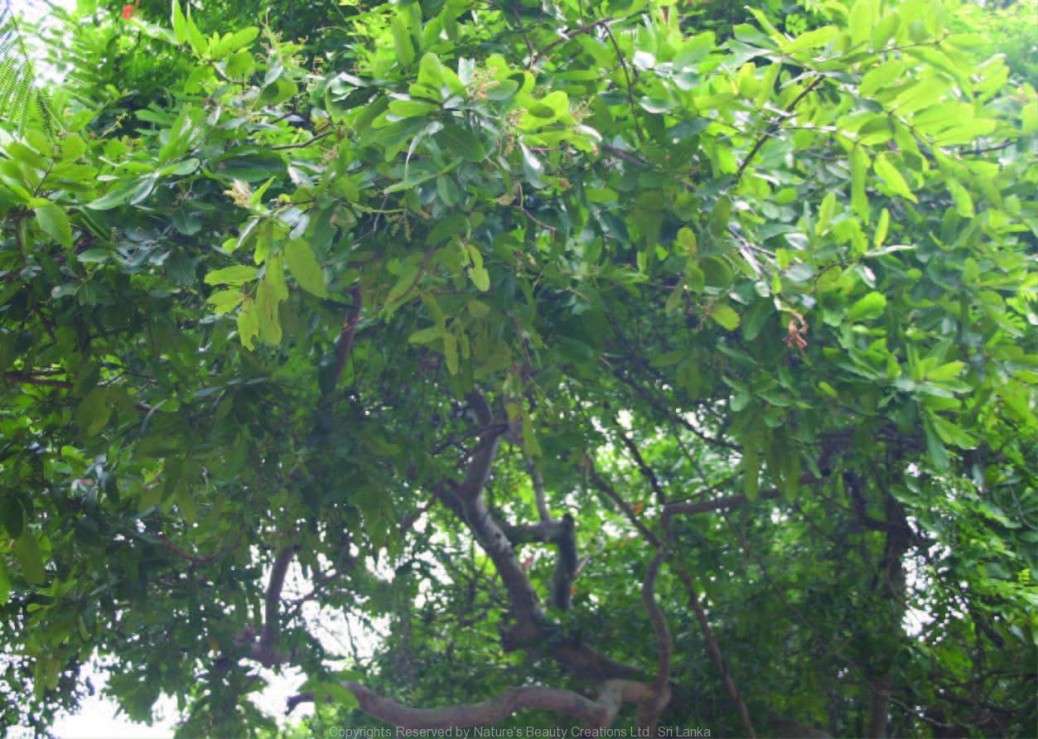Arjuna (also called Arjun Tree and Botanically, Terminalia arjuna) is medicinal plant mainly used for heart diseases due to its cardioprotective and cardio-strengthening properties. It strengthens cardiac muscle (heart muscle) and normalizes (mainly reduces) heartbeat. In addition, it is a good source of minerals, which helps to prevent bone loss (osteoporosis) and improve bone mineral density. It has ulcer protection action, so it is used for ulcer treatment, especially indicated for peptic ulcers. It stops bleeding, so it is beneficial in bleeding disorders. It reduces the frequency of urination, so it is beneficial in polyuria and frequent urination. It has astringent action, so it is helpful in the management of leucorrhea.
Medicinal Parts
The bark of Terminalia arjuna is the main medicinal part used for therapeutic purposes. It is well-known for cardioprotective action.
Phytochemistry (Chemical Composition)
Terminalia arjuna Bark contains minerals like calcium and magnesium. The following phytochemicals are found in the Arjuna bark.
- Phenolic Compounds – terminic acid and arjunolic acid
- Glycosides: arjunetin and arjunosides I–IV
- Flavones
- Tannins
- Oligomeric Proanthocyanidins
- B-Sitosterol
- Casuarinin
- Phenolic acids: ellagic acid and gallic acid
- Lactones
Pharmacological Actions
Terminalia arjuna Bark has a cardioprotective role by restoring the depleted endogenous myocardial antioxidants and improving myocardial function.
According to Ayurveda, Arjuna Bark strengthens the heart and myocardium (cardiac muscles), improves blood circulation to the heart tissue, and improves its strength to pump the blood. These facts are also now verified by some research studies.
Benefits & Medicinal Uses
In Ayurveda, Arjuna Bark is mainly used for heart diseases and as a heart tonic. In addition, it is also indicated in other diseases as listed above. Now, Arjuna is also studied for an ulcer, diabetes, and cancer treatments.
Cardiovascular Health
Terminalia arjuna improves the functions of left ventricle of the heart. It provides strength to the heart muscles and improves the heart’s capacity to pump the blood. It has cardioprotective actions, which helps to preserve the optimum functions of the heart and speeds up the recovery process for cardiac injury. It is most commonly used for prevention from Myocardial Infarction (Heart attack) because it has anti-atherogenic property, which helps to reduce plaque buildup in the coronary arteries and improves the blood flow to the heart tissue.
Atherosclerosis
Terminalia arjuna has anti-atherogenic and hypolipidemic properties. It also reduces low-grade inflammation of the blood vessels and antihyperlipidemic action lowers serum concentration of total cholesterol, LDL cholesterol, VLDL total cholesterol, and triglycerides. It also reduces atherogenic index. A rabbit study suggested a reduction in the atherosclerotic lesion in rabbit’s aorta. These effects are likely to be due to its antihyperlipidemic, anti-inflammatory and antioxidant characteristics.
Therefore, Arjuna bark can be used for its anti-atherogenic action, reducing atherosclerotic lesion and stopping the progress of atherosclerosis.
Heart Failure
Terminalia arjuna reduces manifestations of heart failure. It increases left ventricular stroke volume index and left ventricular ejection fractions. The study suggested it helps to improve exercise performance and effort tolerance.
Terminalia arjuna bark extract improves cardiac output and cardiac contractility index. It prevents and reduces cardiac dysfunction and helps to recover from myocardial injury in congestive heart failure, a rat study suggested. Furthermore, the study suggested Arjuna bark inhibits lipid peroxidation and acts as an antioxidant. Its action was comparable to FLUVASTATIN, a standard modern drug.
Arjuna along with Ashwagandha helps to strengthen heart. In Ayurveda, Arjuna bark is used as Arjuna Ksheera Pak or Ashwagandha Arjuna Ksheera Pak for the treatment of congestive heart failure. It helps to reduce the edema and generally recommended along with Punarnava (Boerhavia Diffusa) formulations such as Punarnavarishta, Punarnavasava, Punarnavadi Kashayam or Punarnava Mandur for the best results. Arjuna bark powder, extract, juice or decoction can be used for therapeutic purposes in people with chronic heart failure.
Coronary Artery Disease
Coronary Artery Disease is a common cause of heart failure in addition to uncontrolled hypertension. Terminalia arjuna helps to stop its progress and further plaque deposition by reducing low-grade inflammation in the blood vessels and coronary arteries. In addition, it also checks cholesterol deposits and plaque formation. It significantly reduces serum cholesterol, triglycerides, low-density lipoprotein and atherogenic index.
However, it may not help alone to treat coronary artery disease, but along with following herbs, it works efficiently to clear the blockage caused by Cholesterol-containing deposits.
- Pushkarmool (Inula Racemosa)
- Shuddha Guggulu (Purified Guggul)
- Triphala (three myrobalans)
- Kutki (Picrorhiza Kurroa)
- Tamra Bhasma (Copper)
- Trikatu Churna
Myocardial Infarction (Heart attack) Prevention
Pre-treatment with Terminalia arjuna and α-tocopherol had protected the rats from myocardial injury on induction of ISOPROTERENOL. The study suggested the prophylactic value of Terminalia arjuna in the treatment of Myocardial Infarction and Myocardial Ischemia because it increases endogenous antioxidants in the heart tissue, which protects the heart from myocardial trauma or injury.
Ischemic Mitral Regurgitation (IMR)
A study suggested that Terminalia arjuna significantly reduces the Ischemic Mitral Regurgitation (IMR) and frequency of angina pain. It also improves E/A ratio, which indicates improvement in the function of the left ventricle of the heart after using T. Arjuna Bark for 3 months.
Shortness of Breath
In heart patients, narrow coronary arteries decrease oxygen supply to the heart, which may result in shortness of breath. As discussed above, Terminalia arjuna reduces narrowness of the blood vessels by treating low-grade inflammation and reducing deposited plaque in the blood vessels, so it also helps to treat breathing troubles in heart patients. For good results, it should be used in combination with other herbs as described under coronary artery disease heading.
Tachycardia & Palpitation
Terminalia arjuna Bark Powder is used in form of Arjuna Ksheera Pak in Ayurveda for Tachycardia and Palpitation. It provides good results. A 3 months therapy with Arjuna Ksheera Pak significantly reduces palpitation and abnormally high heartbeat.
Hypertension (High Blood Pressure)
However, Terminalia arjuna Bark contracts blood vessels due to its astringent action first, but then affects heartbeat and lowers the blood pressure.
Its effects are more observable on systolic blood pressure, according to study. Furthermore, it prevents narrowing of blood vessels by reducing atherosclerotic lesions and plaque deposits in blood vessels, and lowering cholesterol and elevated lipids in the blood, and treating dyslipidemia. Therefore, its long-term use is beneficial in the management of high blood pressure resulting due to atherosclerosis or narrowing of blood vessels or when hypertension is associated with high cholesterol levels or dyslipidemia.
In Ayurveda, Terminalia arjuna is always recommended as a cardiac tonic to improve cardio-vascular endurance and functions in cases of high blood pressure. However, it may not produce significant control over high blood pressure when used alone. Therefore, a combination therapy is recommendable and useful according to underlying causes of hypertension.
Dyslipidemia & Hypercholesterolemia
Terminalia arjuna Bark has antihyperlipidemic and antioxidant actions, which helps to lower serum cholesterol, triglycerides, LDL lipoprotein, VLDL Lipoprotein and atherogenic index. These effects may be due to phytochemicals like tannins, saponins, and flavonoids present in Arjuna Bark.
Bone Fractures
In Ayurveda, a paste of Arjuna Bark is prepared with water and applied on the part of bone fracture after alignment. The application of bark powder is repeated twice a day until recovery.
In addition, 3 to 4 grams Arjuna Bark Powder along with 2 grams of Cissus quadrangularis is advised to take twice daily with Cow’s Ghee and Desi Khand (naturally prepared sugar). It is believed this helps to speed up the proliferative physiological process, which enhances the fracture healing.
Terminalia arjuna is used as Arjuna Ksheera Pak along with Indrayava (Holarrhena Antidysenterica seeds) for the treatment of dysentery. This combination reduces bleeding in stools, frequency of defecation, and eradicates the infection.
Safety Profile
Terminalia arjuna Bark is used in different forms like bark juice, powder, decoction etc. All formulations of Arjuna are considerably safe and well-tolerated in most individuals when taken in recommended dosage under the supervision of an ayurvedic physician.
According to the rat study, there is no oral toxicity found with 2 grams/Kg of Arjuna ethanolic extract.
According to clinical studies, Terminalia arjuna Bark is likely safe in recommended dosage. It does not cause any deleterious effect on kidney and liver functions.
The long-term administration of Arjuna Bark Powder has no side effects and is likely to be safe for kidney and liver. There are no significant changes observed in hematological parameters.
Arjuna Formulations
- Arjunarishta
- Arjuna Ksheera Pak (Arjuna Siddha Kshir)
- Ashwagandha Arjuna Kshir Pak
- Prabhakar Vati
- Arjuna Ghrita
- Kukumbhadi Churna











